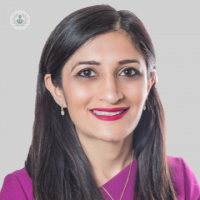Diabetes and the eye: the relationship explored
Written by:Most complications well-known to be associated with diabetes are commonly related to blood sugar and weight. There are, of course, other effects of diabetes that are lesser known, including various conditions of the eye.
Blurry vision, or problems with vision, is a main symptom of diabetes, but how exactly does this happen? In this article, highly experienced consultant ophthalmologist, Dr Rupal Morjaria, succinctly describes three eye-related conditions in detail, including how they are caused by diabetes, and how they are treated.
What is diabetic retinopathy?
Being the fifth common cause of blindness in the world, diabetic retinopathy is also a major cause of blindness amongst working populations in developed countries. It is treatable, and preventing vision loss is also preventable (or can be delayed) if treated early.
Complications of diabetes can occur in the eye due to poor blood sugar control in combination with high blood pressure, high cholesterol, smoking, and other risk factors. These complications may result in mild diabetic changes that do not require treatment, only monitoring, such as a few haemorrhages. However, with more severe disease, it may cause bleeding, new blood vessels in the eye, or fluid build-up in the camera film of the eye that will require treatment.
Diabetes and glaucoma
Developing glaucoma is a higher risk for those suffering with diabetes. Glaucoma causes the pressure in the eye to be too high, and it can cause damage to the nerve which sends messages to the brain. This can ultimately cause changes in the field of vision if not detected early. It is important that the pressure and the nerve at the back of the eye are checked by the doctor monitoring your eyes for diabetes.
Diabetes and cataracts
When the lens is cloudy, it is called a cataract. Our lens helps to focus external images outside in the world onto the fovea, which is a small part of the camera film. As people age, the lens thickens and gets “yellower”. This process can be expedited by fluctuating blood sugar, so people with diabetes may require cataract surgery earlier than those without diabetes.
More about Dr Morjaria
Before all her patients undergo surgery, Dr Morjaria does a full assessment of the eye for risks of post-operative macular oedema. Additional treatments during or after surgery may be required for people with diabetes to help achieve the best outcome.
If you have diabetes and think you may have an eye condition or would like more information, you can schedule a consultation with Dr Rupal Morjaria on her Top Doctors profile.



